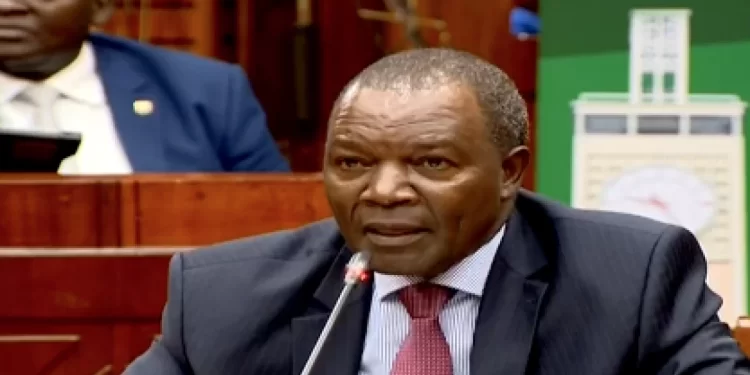Prof. Njuguna Ndung’u, the cabinet secretary for the national treasury, has acknowledged that the country’s economy is under stress due to a lack of funding for important public spending.
Simply said, the nation is in financial trouble, and Ndung’u asks Kenyans to be patient while comparing the national budget to a home budget and claiming that the resources on hand were less than the expenses listed.
His admission regarding the state of the economy dashes the hopes of millions of Kenyans who are currently struggling for a lower standard of living.
“Ukiwa unaishi kwa hii nchi unajua ile matatizo ya hela iko hii nchi, it is something we have to resolve, we have a resource constraint…hatuna hela, lazima tujisaidie. Lakini tukipata hela, yote yatawezekana…tumetoka mbali, huo upungufu utakwisha, hatuwezi sema utaisha leo au kesho, lakini tutakuja kutatua hiyo shida…,” said the Treasury CS on Wednesday.
He was speaking at the Senate Standing Committee on Finance and Budget’s induction forum.
Millions of Kenyans who are suffering from the exorbitant cost of living find it difficult to accept the CS’s update on the country’s economic situation.
“Tuna upungufu, lazima tutulize, tungojee mpaka wakati utafika tuseme tumepata suluhu…bado tuko kwa shimo, lazima tujue hivyo. Kama unaishi hii nchi lazima ujue hivyo…,” added Prof. Ndung’u
The cabinet secretary fails to implement government austerity measures in his statement on the first supplementary estimates for the Financial Year 2022/2023 that was forwarded to the National Assembly.
Only Ksh. 106 billion is suggested to be deducted from development spending, with the remaining Ksh. 92.2 billion being reallocated to recurrent expenses. The government now has savings of just Ksh. 13.3 billion.
The taxman fell short of the revenue collection goal for the first half of the fiscal year, which ran from July to December of last year, by Ksh. 51.8 billion. The Ksh. 108.6 billion shortfall in spending is due to delayed payments of Ksh. 56.6 billion to county governments and lower-than-expected absorption of Ksh. 52.1 billion in recurring and development expenses.
“Hata wewe kwako nyumbani unaweza kuwa broke, lakini si uko na nyumba unakaa? Ni mahitaji yale uko nayo na zile pesa uko nazo unaona hazilingani…? Serikali ni kama kwako nyumbani, uko na mahitaji lakini pesa ya kutosheleza mahitaji yote hakuna. Lakini ukingoja kidogo, ufanye kazi kwa bidi, unapata hela za kutosheleza hayo mahitaji…,” said the CS.
Governors and the national govt are currently at odds over the delayed disbursement, notwithstanding their demands for a larger cut of the budget for 2023–2024. In contrast to the commission on revenue allocation’s proposal of Ksh.407 billion for county governments, the 47 devolved entities are asking for a shared allocation of Ksh.425 billion in the 2023–2024 budget.
However, the Executive argued that there was only Ksh. 380 billion available.
“Ksh.425 billion is good, but we don’t have it. Ksh.407 billion is not bad, but we don’t have it, what we have is Ksh.380 billion, that is the truth. If you want to hang us, we are helpless, if you want to remove our trousers and whip our buttocks, go ahead, we don’t have the money. What we don’t want is to cheat the governors that we will give them money that we don’t have…,” DP Gachagua said recently.
Governors will consult with President Ruto this weekend during a retreat to discuss the ongoing financial crisis.
The National Treasury claims that for the time being, the national debt, which was Ksh. 8.7 trillion as of September of last year, is being managed.
Prof. Ndung’u explains that if we borrow, we can only use the money to pay off expensive short-term debt, such as domestic debt, so we must borrow money at a low interest rate to pay off the debt. This is a strategy that has been proven to work.




